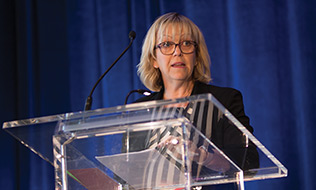

Motivational interviewing can be a powerful way for health coaches to improve patient outcomes, said Ann Stirling, senior director at CAREpath Inc., during her presentation at Benefits Canada‘s 2018 Healthy Outcomes conference in Toronto.
For people having difficulty managing a chronic disease on their own, motivational interviewing can help them take on the challenge, she suggested.
Stirling gave the example of a particular patient named Joe, who was brought into the program by his daughter. “Joe is only 63 years of age but has unstable diabetes, unstable blood pressure and is now going into kidney failure related with his disease,” she said.
Read: How health coaching can help diabetes patients
Understanding how Joe got to his current state is key to understanding what level of coaching he might respond to. While traditional interactions with health professionals tend to involve making specific recommendations, health coaching has a more collaborative approach, noted Stirling, suggesting that simply telling the patient what to do can sometimes increase resistance.
For Joe, the coach needs to ask the right questions to help him develop the skills he needs to manage his conditions, she said. “Joe is very complex. He is very knowledgeable in diabetes management, in managing his blood pressure in a logical sense, but his problem is that he literally has a bag full of pills that he has to sort through in order to make sure that he’s taking the right medication at the right time. He goes to the emergency room when his blood pressure is out of control, but he has no idea about when he should start to do something himself.”
Joe was also going through a divorce so his motivation level to make a change to his health was very low, said Stirling. He needed non-judgmental, continual support to make the right changes, she noted.
Read: Leveraging teachable moments among tips for boosting wellness programs
Getting the pills under control was the first order of business. “For him, it was as simple as him taking that bag of drugs back to his pharmacy and getting them to put them into blister packs that had a week’s worth of drugs, separated by day and by times of day when he should take them,” said Stirling.
Before motivational interviewing identified the right approach, it was unclear whether Joe was taking his medication properly. Once the stress of his personal situation decreases, the health-care provider can look at other strategies to boost his readiness to make other changes in his life, said Stirling.
Read more coverage from the 2018 Healthy Outcomes conference.
